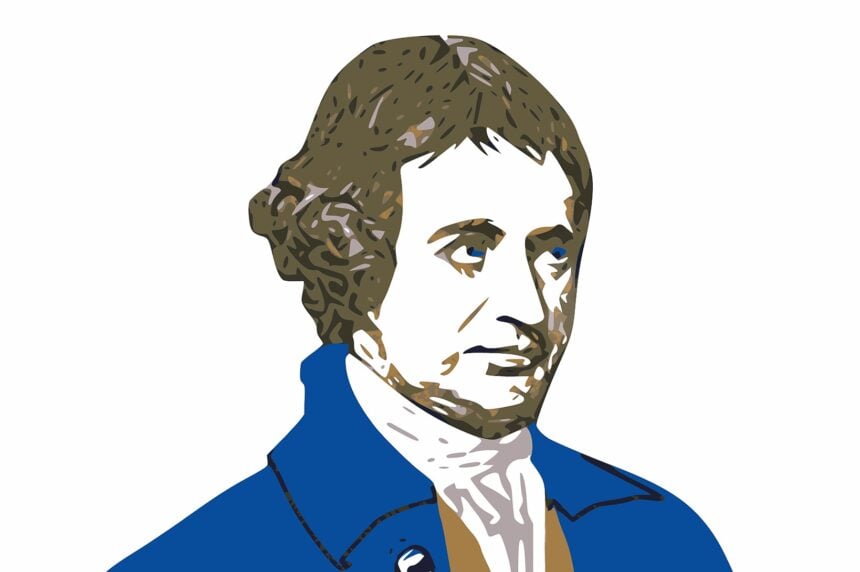(What follows is a meditation on Bastille Day, a national holiday celebrated in France on July 14 to commemorate the Storming of the Bastille. The first part, on the horror and violence that ensued after the Storming, is here.)
The Franco-Kantian Enlightenment, the ideological foundation of the French Revolution, and the revolution itself, had an early and formidable critic in Edmund Burke. As early as 1790, before the Terror started in earnest, in his Reflections on the Revolution in France, Burke challenged the reasoning underlying the proclamation of abstract human rights. He rejected its claim to universality, its notions of natural law, its individualism.
Rejecting the revolutionary project of a radical reconstruction of the social order, preferring empiricism to idealism, Burke upheld the English concept of rights gradually acquired over the course of history and valid for a given society at a given time. To this day, his Reflections remain a defining tract of British conservatism as a self-conscious, fully conceived political philosophy.
While Burke is known to every properly educated person in the English-speaking world, the philosopher, writer, diplomat, and prophet of the counterrevolution, Joseph de Maistre, is not. Maistre (1753-1821) was not a liberal, like Burke. In fact, he wanted “a counter-Revolution, which would not be a contrary revolution but the opposite of the Revolution.” For Maistre, the Revolution was the unfortunate, if logical, culmination of a godless century that idolized individual achievement at the expense of divine order and tradition. Taking a pessimistic view of history, he insisted that the individual should be subordinate to his community and society, to authority, and to Providence.
Falsely accused by Isaiah Berlin of being a forerunner of fascism, Maistre wanted to see France’s return to the unwritten laws and to divine revelation while at the same time admitting the tragically irreversible nature of the Revolution. Novelist Jules Barbey d’Aurevilly, now forgotten but popular in the Third Republic, memorably called Maistre a “prophet of the past.” Uncompromisingly anti-modern, Maistre remains to this day the emblematic figure of the counterrevolution. Thanks to him more than any other man, the concept of counterrevolution in France has developed an imagery hostile to the whole of the modern world since the Reformation. To him, the Revolution was an irredeemably bad event, the only merit of which was to punish France for its action in the service of the Enlightenment.
Hippolyte Taine’s 1875 magnum opus, The Origins of Contemporary France, was significant because its author—an immensely respected historian, literary critic, and philosopher—could not be dismissed as a dyed-in-the-wool reactionary. This gave him a credibility with the “modern France” of the early Third Republic that was denied to other authors hostile to the Revolution, such as Maistre. Exasperated by the country’s chronic instability and horrified by the Paris Commune, Taine did not content himself with denouncing the Terror. He attacked the very principles of 1789, both abstract human rights and sovereignty of the people.
Taine’s criticism of the focus of the revolutionaries on abstractions—which led them to believe that society can be transformed by the reign of reason once it has broken with prejudices—sounds eminently Burkian. Indeed, Taine’s criticism of the Revolution is inseparable from his praise of liberal England, which, in his view, knew how to reform everything without abandoning its constitutional legacy and knew that political freedom—which adapts to privileges and prejudices—is in fact “the fruit of accepted inequality and tolerated disorder.”
A conservative liberal, Taine had little in common with the prophets of the counterrevolution. In Maistre, he saw above all a defender of the Pope and of the Vatican, whose power and closed-mindedness were for Taine one of the major causes of French misfortune. By contrast, Taine explained, England knew how to give itself a form of religion compatible with the freedom of the individual and the scientific spirit. Aloof from the Catholic counterrevolution, Taine is no less distant from the subsequent Action Française of Charles Maurras, which saw itself as the heir to royalist France.
Taine did not seek to restore the monarchy but wished (without believing in its practicality) to see in France a parliamentary regime modeled after Westminster. However hostile he may have been to the Revolution and, ultimately, to the left, Taine was not a man of the far right and did not belong to the “classic” counterrevolutionary tradition. He belongs to the narrow lineage of conservative liberals who ultimately rejected the essentials of French political culture as a whole.
This trio—Burke, Maistre, and Taine—developed three distinct lines of criticism of the French Revolution in the first century after the fall of the Bastille. For those curious, it may be rewarding to look into the criticism of the Revolution articulated in the first half of the 20th century by Charles Maurras, Martin Heidegger, and Carl Schmitt.
Image: Edmund Burke (From Levan Ramishvili / via Flickr, in the Public Domain)

Leave a Reply